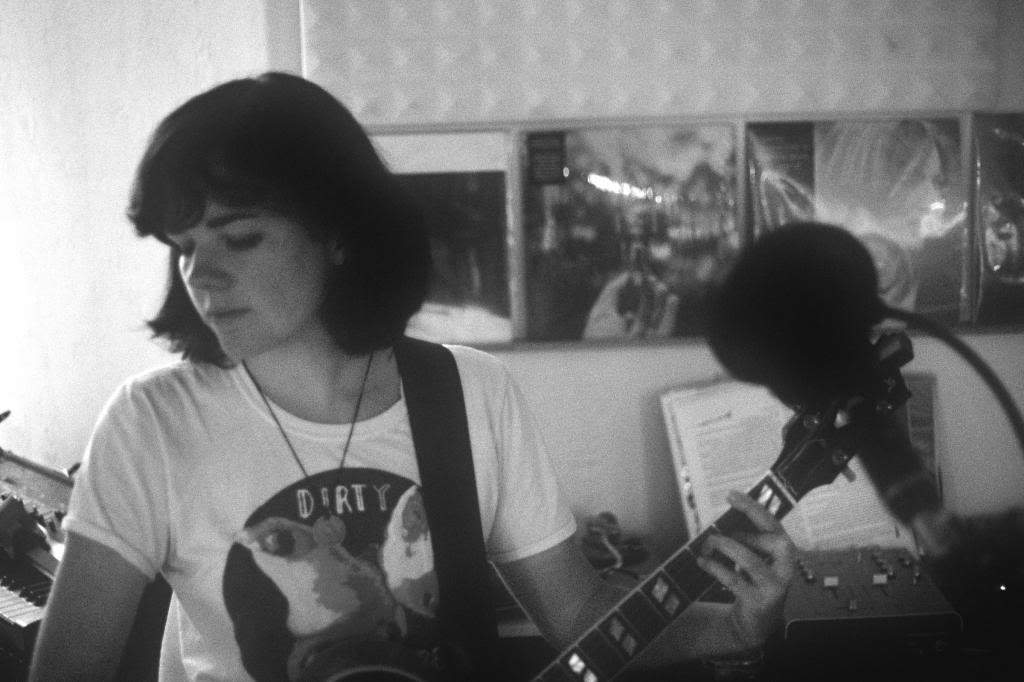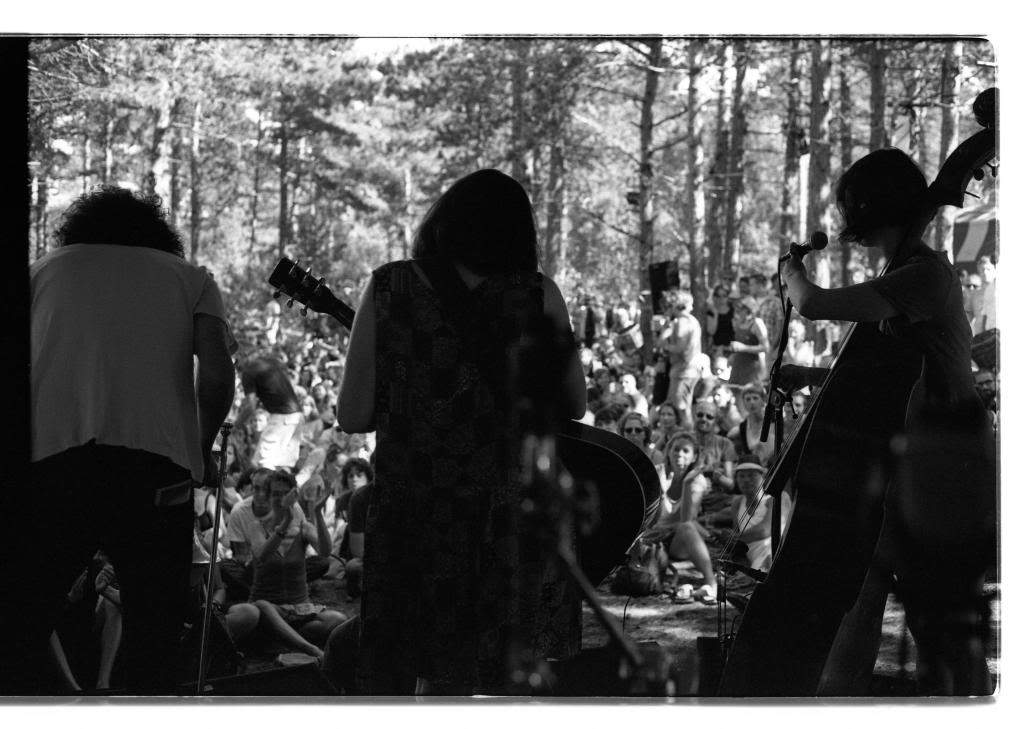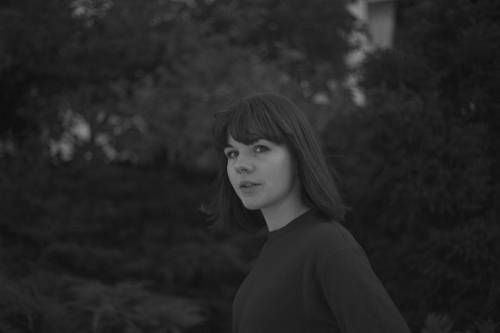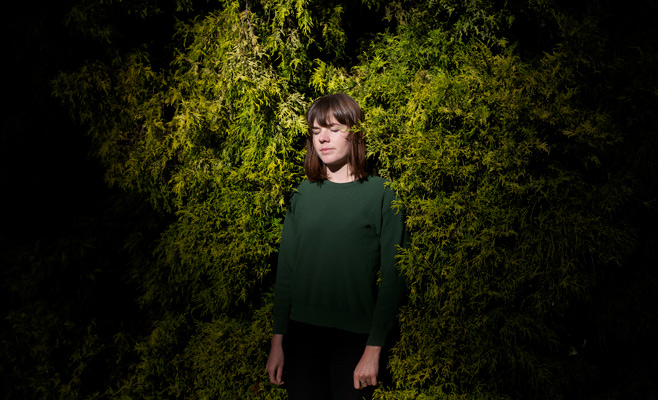Tiny Ruins On Creating Good Art Out of Banality
"It’s that kind of sense of fobbing away a part of yourself – the more that I felt that, the more I scrambled to make the most of my songwriting."
Tiny Ruins' music is that lingering, welcoming hug from an old friend, the cloak of warmth that being home puts on your shoulders as you step in through the front door. In a quiet way, Hollie Fullbrook, the girl behind the sound, is much the same. She's thoughtful. Warm. And while she speaks in a hushed way, she likes to untangle questions fully, pausing before spreading out her articulate and highly personal thoughts generously.
The meandering conversation we had at Conch dallied into many topical furrows and nooks before we said goodbye, she giving me the warm hug her songs had always promised. Below is a record of a few key pieces of wisdom and observations emitted from Hollie's mind before that hug.

Concrete Playground: You wrote your first album, Some Were Meant for the Sea, while still studying for your law and arts conjoint degree at Victoria University. How has your style of writing changed with each album?
Tiny Ruins: I think for my first album I was writing those songs and I had no inkling that anyone would hear my songs other than my close friends and flatmates.
It's actually now more than any other time that I've found other people listening to my songs, not interfering, but that it affects me at the writing stage. Like I wouldn't be thinking about others beforehand. I feel like it is more... that there is now an interjection type voice that asks 'but how is the listener going to think', or 'what do you actually want to say to the listener?'. And it never used to be like that and I don't know if it's a good thing, um, I can imagine it would affect most people who … a writer or artist or any type who start feeling more conscious of the fact that what they write is going out into the world.
Also, the first album was fantasising about having a more interesting life and the second album was having a more interesting life. So the second one feels more… it feels more directly about things happening to me where the first album was fuelling my own experiences into other characters lives. You know, Rosie in the Adelphi apartments was a fictitious character which was kind of drawing from the things I doing at the time.
CP: You have a pretty interesting journey into becoming a 'Musician'. You've said in the past that you didn't study classical music because you thought it was too constrictive, but then went to law school and then used music as your escape. It reminds me of a lot of Kafka. He wrote these crazy, tripped out stories that seemed like lucid dreams, but he then he was also working as straight-laced lawyer and lived with his parents in this strange in-between room between their bedroom and the living room –
TR: That's like my life right now. I'm living with my parents. (Laughs.) I do like the idea of banality. That a really boring job can push your creative mind further. You end up in a desperate position where you have to make more of your free time and weekends. And it's that kind of sense of fobbing away a part of yourself – the more that I felt that, the more I scrambled to make the most of my songwriting. I felt like I needed to do something about it now or it was going to be too late. Maybe it was a little dramatic, but yeah. Sometimes you need a bad situation to make good art.
CP: Do you think there's a suffering coefficient in all good art?
TR: I recently listened David Lynch's Catching the Big Fish, and it talks about different ideas of creativity, mostly addressing filmmaking, but I think it's kind of good to remember that you don't need to be suffering to make good art. You just need to try and understand suffering. If you're suffering and in a bad space it actually stops you making good art. The idea of having to put yourself through a fire and brimstone lifestyle to be able to create something authentically is wrong. And it's more about being in a good place, a solid frame of mind, and that you can understand other people suffering. To an extend, obviously you can't understand it if you have no lived experience of it, but you can empathise with it still. And that's important. It's important for me, because I feel like I've had a good life. I've grown up in New Zealand. My parents are still together. I've always had regular jobs. A pretty middle class privileged white upbringing. Everybody has their own struggles and pain and whatever, I think it's good to realise that you can be creative and put out really interesting stuff by trying to understand people and their suffering as well as your own.
I think a lot of the drug abuse and things musicians would put themselves through – from like the sixties and seventies – they were kind of lured into by thinking it would help their art. But it ended up screwing them over – I watched this documentary about Rowland S. Howard from the Birthday Party (the band with Nick Cave). And you know was a heroine addict, and he had been for his whole life. It was a heartbreaking documentary. His partner at one stage said that, you know, it wasn't that his drug dependency fuelled his creativity, he was constantly frustrated and it stopped him from being as creative, as product as he could have been. I'm all for drawing on the weird and wonderful parts of human experience to help your creativity, but if you're ruining your health and your life then you're just shooting yourself in the foot.
Having written one album entirely in Wellington and another while travelling, which do you find more inspiring - travelling or staying in one place?
It's funny, because when I left high school I was working for a few months to go travel in the US. I worked for two months as a lifeguard in a summer camp and then went travelling. And it was an amazing, intense travelling experience and then when I came home (I didn't really want to come home but my visa expired), I felt I had to go to university and knuckle down, and sort out my life – even though I was only 19. So I moved to Wellington and then it was just five years of studying and I thought 'what have I done? I want to be doing interesting stuff'. It's only in retrospect that I realize that those five years were interesting, and that living just in one place doesn't make it less intense. Travelling can be as dull as living in one place, I think. It just depends on what other things are happening in life.
Whether it's touring or travelling sometimes I'm so overstimulated I'm not stimulated. Like I'm not taking in anything anymore. And then after being back home for a little while I find everything inspiring again. It's funny because you think you'll feel differently going travelling, but you realise that you're still the same – you still get up in the morning doing your usual rituals or whatever, your problems don't leave you, the people you care about doesn't change… it took a while for me to get my head around that.
What's your song writing process like?
I'm a pretty slow writer. People are surprised things were written that far back, but it takes a while for me to feel happy about something and say 'yup, this is a song'. My process is usually that I'll sit down with a guitar and find some chord progression or finger-picking thing and I'll like it and start building lyrics on top of that. I'll also have demos on my phone and think about what lyrics came to mind. And so, these little guitar parts might sit around for months and months on my phone before I think 'this song is about that'. Sometimes I write the lyrics first and then have the music come along later. Some songwriters can only write the guitar part first, or the lyrics first, but I just do whatever works.
Once I have a chorus or a chord progression I'll play it to Cass and Alex and they'll give some input, and then once it has its own shape we'll work on it more as a band. Often with basslines and such Cass and Alex would come up with those parts, so they had a lot of input in the arrangements of Brightly Painted One.
How do you know when a song is ready?
It's one of the best feelings in the world. Because, it is The Moment. Everything clicks, you think 'that's it, that's the song' and it doesn't need anything else done to it. Sometimes a song would just have one or two lines that I'm just not quite happy with. 'Carriages' was like that. A year after writing the song I was still tinkering with one of the lines, where I just felt it wasn't as good as it could be. But when you do know the song is done, there is a sense of relief: that you haven't lost the ability to do it. And also you feel, yeah, pleased with yourself for being productive. But there is a constant feeling of not having done enough. I was watching a doco the other day about a jeweller saying it's just this feeling of such fulfilment and pleasure when she looks at whatever she's made that day, and as a songwriter it's the same thing. But it's not like you write a song every day, it just happens every once and a while – every few weeks or months.
When it does happen it's very exciting, you kind of fall in love with the song you've just created, there's a period – and it doesn't last very long - where you think 'this is the greatest song in the world'. (laughs) I think I felt it about all of my songs, but it quickly leaves you and you think 'oh no it's terrible'. But that's kind of the sign that it's finished, that rush of feelings. That you fall in love with it, that you feel very protective of it, that you want to look after it, and not show it to anyone yet.
CP: You created a song with David Lynch for the recent Hunger Games: Mockingjay, Part I soundtrack [it didn't end up making the final cut on the album, but still]. Being a songwriter how do you find your writing process changes when collaborating with other people?
TR: All the collaborations that I've done haven't been writing collaborations. With David I sent him a bunch of demos and he chose the one he wanted to work with - I wasn't even sure if he was going to like any of them! So the song had been written and demoed, and he produced it, so he bought his own… his own way of recording the song which was different from the demo. He kind of directed me. His influence was in the arrangements and soundscape. But in terms of writing with other people, I've resisted it. It doesn't really work like that with me. The one song I wrote with someone else was years and years ago and it just doesn't feel true to me. It doesn't feel personal. Maybe at some point in the future I'd like to have a different musical project and I'd be interested in working with other people, it would be quite freeing to have something more arm's length. Having something that isn't personal and just bright and fun. I do enjoy playing in other people's bands for that reason, or learning other people's songs. There's a release in it not being about you, and just being a musical enjoyment.
CP: How do you feel performing your own songs and sharing that personal aspect of yourself with strangers?
TR: It's still incredibly hard when I play a new song to Cass Basil (Hollie's bassist) and Alex Freer (drummer) for the first time. I feel incredibly self-conscious. I know when I started performing I had that feeling too, like who could I possibly share this with? Even though the songs aren't blatantly emotional –
CP: But you know it is.
TR: Yeah, exactly! I think a little secret part of me wanted to play in a band because it dissipated that feeling a little bit. And it made it more 'we are a team', it's not just me. It gave me a feeling of having the focus not so much on me. And I feel like once we actually record a song, I've gotten over the hump of feeling self-conscious about it. By the time we perform it to the audience that feeling is almost gone and I'm freed from the awkwardness of it, and instead it's a real adrenaline rush. You're still vulnerable but you're not feeling really nervous. But it's still the feeling of other people reading your diary. It's actually so cool when you get over it, because you feel way stronger. That you can kind of deal with anything if you can play a song that means a lot to you and be okay with other people hearing it.
CP: What about your older songs? Do you ever feel like you've moved past a song? Songs you would take off your set list for that reason.
TR: There are no songs that I refuse to play or anything like that. But there are songs that I don't feel as connected to anymore. Like the song 'Little Notes' which is from my very first EP, people really connected to that song, people still tell me it's their favourite song, but I'm kind like 'eh'. And I'm not really sure why but I don't feel like playing that song as much as other ones. I can imagine that if you wrote songs about past relationships then I can imagine that at some point you don't really want to revisit them. I think when you perform a song you're transported back to the moment you wrote it and it's almost like a bit of a time travelling thing – for me it is anyway.
As long as you haven't played it into the ground, when we were touring last year I was playing every night and I though wow I've really been playing these every night for months and months and I started losing the feeling of what they were about, but after a month or two of being home I had a band practice session and I was like 'ah, I'm back'. It kind of comes and goes, depending on how much you're playing it.
CP: Do you ever find yourself connecting more with songs over time? That there are certain songs that you may not quite understand when you write them, but then perhaps years later you finally grasp? That it's almost full circle experience.
TR: Definitely. That's happened quite a lot. People who know me would often comment on songs and say 'oh, you've obviously written your song about that experience', and I would say 'no, it's actually three years before it happened'. One that I think is especially about that is the song 'She'll Be Coming 'Round'. 'Cause I wrote that before I recorded my first album. But it's funny because years after I wrote it, I was in Italy and had this scooter accident and broke my foot, my shoulder and my hand and I had broken up with my boyfriend in the same week and it was all kind of a disaster, I had to be flown home and treated at a hospital in New Zealand. It was all a bit traumatic at the time, and my dad said 'Oh, She'll Be Coming 'Round is about that experience.' But then, it wasn't, but it could be, it was very appropriate for that experience. But yeah, a song can often come back to bite you a little bit. Some lines become more pertinent than others the older you get.
It's the hope that I have, I'm trying to write songs that will keep changing for me, that will keep being interesting for me for whatever reason – that the lines will be interesting enough, and so far it's been good. I do wonder what I will feel about them if I'm still singing them in sixty years. But I like the idea that the song can keep teaching the singer and keep saying something new to you.

Bic Runga and Tiny Ruins will be touring through New Zealand late June and early July, performing in Auckland on the 2nd and 3rd of July and Wellington on the 4th of July.








